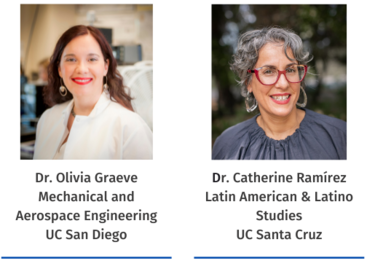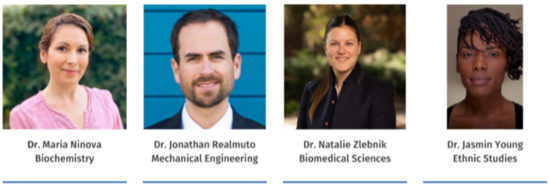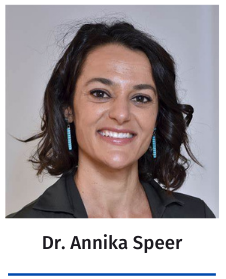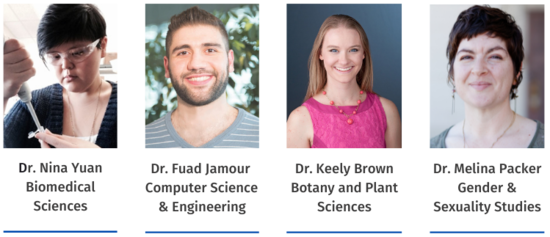Supporting Graduate Students' Academic and Professional Success

Graduating within the next year? Wondering how to get started on your journey into academia post-graduate school? You may be looking for the right post-doc for you or you may be getting ready to apply to academic positions. Well, don't worry. The Graduate Student Resource Center has you covered! This month the GSRC hosted our 2021 After Grad: Academic Pathways Week where we hosted a variety of workshops, speakers, and panels. From challenges as first-generation students to tips on how to prepare for the academic job market, the speakers had something for everyone. Below, you can find a summary and important insights from each of the events.
To access session recordings, please visit our website.
First-Generation Faculty Keynote Panel
[Image Description: Headshots of Dr. Olivia and Dr. Catherine Ramírez]
Kicking off this week was Dr. Catherine Ramírez, Professor in Latin American & Latino Studies at UC Santa Cruz and Dr. Olivia Graeve, Professor in Mechanical and Aerospace Engineering at UC San Diego who discussed the value of education and the challenges they faced as first-generation Latina students navigating higher education. This panel was moderated by Dr. Flip Tanedo, Assistant Professor in Physics & Astronomy at UC Riverside. Both Dr. Ramírez and Dr. Graeve mentioned the importance of their family’s role as they navigated decisions during their education. By supporting first-gen students, they believe that not only does one create opportunities for that one student, but for younger children in their families or in their expanded network, too.
They highlighted that due to the difficulty of navigating higher education it is important to ask the right questions, find the right mentors, be persistent, surround yourself with the right community, and not forget to advocate for yourself---even if you may not know what you are supposed to be advocating for! Together, they agreed that one should do a post-doc if one aspires to go into an academic position and to take advantage of the services that are in place for graduate students while you can at your graduate institution.
UCR New Faculty Panel
[Image Description: Headshots of Dr. Maria Ninova, Dr. Jonathan Ramírez, Dr. Natalie Zlebnik, and Dr. Jasmin Young]
Networking, publications, strong letters of recommendation, finding the right mentors, and finding the right advisors were the key ingredients to securing a faulty position shared during the UCR New Faculty Panel. Dr. Maria Ninova (Biochemistry), Dr. Jonathan Realmuto (Mechanical Engineering), Dr. Natalie Zlebnik (Biomedical Sciences), and Dr. Jasmin Young (Ethnic Studies) were all present during this year’s New Faculty Panel. The panelists discussed their academic job search experience, from preparing for the academic job market to negotiating their salaries. Applying to faculty positions may be overwhelming, but the panelists shared that finding their motivation and having discipline kept them on track.
To prepare for the academic job market, they highlighted talking to your network, faculty, and the heads of search committees. As you work on cover letters, make sure to tailor each to the institution that you are applying to, be clear, and have threads throughout your material to make sure that it all connects. Ready for interviews? The panelists recommended having questions ready, doing mock talks among friends and colleagues, and getting good sleep before an interview. Dr. Young noted to not forget to negotiate your salary. It is important to advocate for yourself and remind the committee of what you bring to the institution.
Interviewing for Faculty Positions
[Image Description: Dr. Annika Speer looks at the camera and smiles]
Dr. Annika Speer, Professor of Teaching, Theatre, Film, and Digital Production at the UCR Theatre Department, also highlighted the reality of the academic job market in her talk. As one prepares for the academic job market, Dr. Speer recommends that one performs professionalism by preparing, practicing, and dressing accordingly. If doing interviews over zoom, she recommends that you avoid a background and stick to a white wall. To prepare for an interview she brought up some important tasks: practice out loud, get clarity on format, and prepare LOTS of questions for the search committee. During your interview, she suggests organizing yourself, preparing specific examples for potential interview questions, and showing your personality. In her words, “they are hiring a colleague, not a robot”! Dr. Speer also brought up the STAR (Situation, Task, Action, Results) Method and PARS (Problem, Action, Results, Skills) Method. These methods serve as tools to help you answer questions during an interview. She notes that it is important to take your time, to not apologize, and to not forget that you are interviewing them too.
An Introduction to Academic Cover Letters
[Image Description: A man wearing glasses, bow tie, and sweater vest claiming "I am an academic"]
Pictured: The cover letter may be your first opportunity to prove you're the perfect fit the academic position of your dreams!
Graduate Writing Center Coordinator Alexis Smith led a workshop titled "An Introduction to Academic Cover Letters." She highlighted key points to consider as one prepares and writes an academic cover letter, including remembering the purpose of a cover letter, the guidelines of what to do and what to avoid as you write, and the components of a cover letter. Remember that a cover letter may be your first opportunity to make an impression on your future employer and colleagues; therefore, Smith recommends that you demonstrate your qualifications with vivid examples and descriptions. Some "do’s" include using active voice and tailoring each cover letter for the role to which you are applying. “Don’ts” include using submissive language, repetition, and writing long and overly complex sentences.
Most importantly, Smith highly recommends that you do your research. Make sure to check out the office of the president or provost for materials on the university mission, strategic plan, and student demographics. It may be a good idea to also double check on Academia.edu and LinkedIn. Lastly, Smith shared to pay careful attention to the wording of the job announcement you will be applying to.
UCR Postdocs Panel
[Image Description: Headshots of Dr. Nina Yuan, Dr. Faud Jamour, Dr. Keely Brown, and Dr. Melina Packer]
Wondering what it takes to find the right postdoc for you? Dr. Nina Yuan (Biomedical Sciences), Dr. Faud Jamour (Computer Science & Engineering), Dr. Keely Brown (Botany and Plant Sciences), and Dr. Melina Packer (Gender and Sexuality Studies) joined Academic Pathways Week for our UCR Postdocs Panel. Together, the panelists discussed the search process, how they decided what postdoc was best for them, and tips on how to prepare pre and post the search process. As you get ready to start your search, look at your personal network and your advisor’s network. You may already know a professor or know of an institution that you may want to work with; therefore, the panelists recommend following up with professors and to be clear about what you are interested in doing to contribute to a PI's work and the postdoc. As you prepare for your interviews, learn what projects your potential PI is working on, do your research, talk with students you may potentially be working with, and have questions ready. Deciding on what postdoc to agree on can be hard, but having options may not always be the case. Dr. Yuan and Dr. Jamour shared that they only applied to one postdoc and, thanks to their networking skills, they were able to secure the position. Once you arrive to your postdoc, the panelists shared that you have more independence working in a postdoc. You will make your own schedule, find ways to prioritize your own work, and you will have to learn how to manage your time to be successful in your position. Overall, think of your larger academic trajectory while you find the right postdoc for you.
Advanced Academic Cover Letter Clinic
[Image Description: Kermit the frog typing quickly on a typewriter]
Pictured: Writing cover letters while on the academic job market can feel like a job in and of itself!
Finally, we closed out the week with an Advanced Academic Cover Letter Clinic. Graduate students had an opportunity to bring their job announcements and a draft of their cover letter to the clinic, where they worked with Graduate Writing Center consultants to tailor their cover letters to fit their specific positions of interest.



